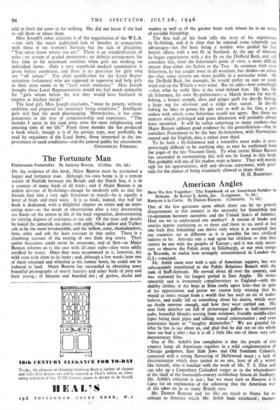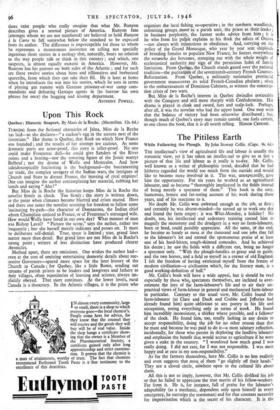American Angles
ONE of the few questions upon which there can be no general disagreement in this country is the necessity for friendship and co-operation between ourselves and the United States of America. How are we to understand one another? A stream of books and articles appear explaining us to them and'them to us, until at last one feels that friendship can thrive only when it is accepted that our countries are as different as it is possible for two civilised nations to be. America sets a seal upon her children se that they • cannot be one with the peoples of Europe; it was only neces- sary to observe the Polish army in Edinburgh, or our own troops in Brussels, to realise how strangely unassimilated in London the G.I.s remained.
Mr. Arbib came over with a unit of American sappers, but was subsequently transferred to the Public Relations Branch with the rank of Staff-Serjeant. He moved about all over the country, and was stationed for his longest period in East Anglia. He • writes smoothly and is immensely complimentary to England—only, the shabby clothes of the boys at Eton really upset him—but in spite of his appreciation and praise we cannot help wishing that he would at times escape from a world that has such an air of make- believe, and really tell us something about his duties, which were no doubt onerous enough, and how they were carried out. His neat little sketches are full of picturesque gaffers in half-timbered pubs, beautiful blondes waving from windows, friendly middle-class types biting their pipes and talking sound commonsense ; and even prostitutes figure as " haughty demoiselles." We are grateful for what he has to say about us, and glad that he did not on the whole have too bad a time ; but it is all a little like one of those very safe documentary films. One of Mr. Arbib's few complaints is that the people of this country lump all Americans together in a wild conglomeration of Chicago gangsters, East Side Jews and Old Southern Colonels, cemented with a strong flavouring of Hollywood sauce ; a lack of discrimination which does justice to no one, least of all a writer like himself, who is familiar- with the work of Mr. T. S. Eliot and can take up a Canterbury .Cathedral verger as to the whereabouts of the skull of the fourteenth-century archbishop Simon de Sudbury. Mr. Arbib's criticism is just ; but we must turn to Runyon a la Carte for an explanation of the colouring that the American way
of life takes on in so many British eyes. . Mr. Damon Runyon and his like are much to blame for an attitude to. America which Mr. Arbibfinds misplaced ; because
there exist people who really imagine that what Mr. Runyon describes gives a normal picture of America. Runyon fans (amongst whom we are not numbered) are believed to hold Runyon a la Carte to fall somewhat below the standard to be expected from its author. The difference is imperceptible for those to whom he represents a monotonous insistence on telling not specially ingenious short stories in a neology that, naturally, bears no relation to the way people talk or think in this country ; and which, one suspects, is almost equally esoteric in America. However, Mr. Runyon has his patrons on both sides of the Atlantic ; and for such are these twelve stories about bims and zillionaires and barbecued spareribs, from which they can take their fill. He is least at home when he introduces the war into his stories, which he sees in terms of playing gin rummy with German prisoner-of-war camp com- mandants and defeating Gestapo agents in (to borrow his own phrase for once) the hugging and kissing department.
ANTHONY POWELL.































 Previous page
Previous page